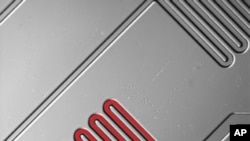Scientists have developed an inexpensive, portable blood test kit that can tell within minutes whether a person has HIV or syphilis. The device was successfully field tested in the African nation of Rwanda, and researchers say it could provide a faster, cheaper and easier way to detect infectious diseases throughout the developing world.
Watch related Vidushi Sinha video report
The mobile microfluidic chip, or mChip, is the brainchild of Samuel Sia, a biomedical engineer at Columbia University in New York.
He says the small plastic device can diagnose HIV and syphilis within 20 minutes, using only a microliter of blood.
“What we’ve done is to miniaturize what is traditionally a complex laboratory blood-based test into something that you can hold in your hand, the size of a credit card, so that you can just finger-prick a drop of blood, put it into the card and about 15 minutes later, you get the results,” he said.
The disposable mChip costs only $1; the entire diagnostic kit costs about $100. Sia says the mChip was tested on over 400 blood samples at a hospital in Kigali, Rwanda.
He says the chip was 100 percent accurate in detecting HIV, with only one so-called false positive case in which a volunteer was incorrectly diagnosed with the virus that causes AIDS. In terms of syphilis testing, the mChip accurately detected 94 percent of positive cases with only four false positives out of 67 samples.
Sia says the results were comparable to laboratory testing.
“You really want to make sure you are catching anybody that can possibly have that disease. And so we were able to do that for both diseases in the same card, which hopefully we can expand upon in the future and have multiple diseases in one card,” Sia said.
Sia says the mChip is a miniaturized version of a full-sized lab, with a tiny blood collection well and chemicals that react to the sample, producing a color-coded result.
Sia says it works like an ELISA, or enzyme-linked immunosorbent assay, which is widely-used to identify the antibodies a patient's immune system produces in response to disease.
The mChip is different than existing rapid tests for HIV and pregnancy, according to Sia, in that it can screen for complex illnesses in remote, resource-poor regions where people don’t have access to a clinic or hospital with laboratory testing.
In addition, he says the chip has the potential to lower health care costs in developed countries. Sia is a founder of the company Claros Diagnostics, which is exploring various applications for the mChip and helped develop the kit used in Rwanda. Last year, the company released a version of the mChip that can help diagnose prostate cancer.
An article describing the mChip is published in the journal Nature Medicine.




